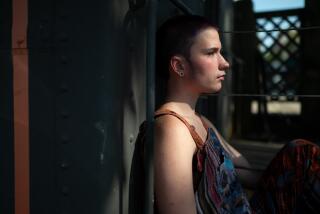Medicaid and Social Security changes urged to help gay seniors
Reporting from Chicago â Lesbian, gay, bisexual and transgender senior citizens face myriad social and financial problems, and lawmakers could help them by altering Social Security and Medicaid rules, according to a national report being released Wednesday.
The report, prepared by Services and Advocacy for Gay, Lesbian, Bisexual and Transgender Elders, or SAGE, has been endorsed by major mainstream aging groups, including AARP and the American Society on Aging.
âThis is the first time that the heavyweights of the aging network are really embracing a comprehensive look at the needs of LGBT older adults,â said Michael Adams, executive director of SAGE. âWe know there are anywhere from 2 to 3 million LGBT seniors in this country. Weâre talking about a very significant portion of the older population in this country.â
The report, to be released in Chicago at a national meeting on aging, highlights three key areas: financial security, healthcare and social support systems.
It calls on federal and state lawmakers to consider ways to legally recognize same-sex relationships so aging partners in a committed relationship can have access to the same support systems that benefit heterosexual seniors. That would include Social Security survivor benefits and the rights of same-sex partners to make medical decisions for each other.
Tom Nelson, chief operating officer of AARP, wrote the reportâs foreword and said Tuesday that his organization wanted to see the needs of LGBT seniors discussed -- and met.
âWhether itâs in an institution where someoneâs receiving care or whether itâs some of the fundamental building blocks of retirement security like Social Security, we want to have that discussion about how you make sure people have access to those kinds of benefits,â Nelson said.
âWe donât want to see discrimination in care facilities. This report should help people start thinking about all the dimensions that need to be addressed in the LGBT community.â
Estimates point to a national LGBT senior citizen population of 3 million, expected to grow to at least 4 million in the next decade.
Serena Worthington, director of the SAGE program in Chicago, said she routinely saw seniors at her groupâs twice-weekly luncheons who felt socially isolated. Some have never come out of the closet. Others were out but then moved into a nursing home and thought they had to hide their sexual identity.
âIf you were coming of age when it was illegal or immoral to be gay or lesbian, you could be considered mentally ill,â Worthington said. âAnd now you picture seniors walking into senior centers still holding that fear of rejection. Many LGBT seniors are just not accessing social services, and so they become increasingly isolated.â
For same-sex couples, Worthington said, if one person needs to spend assets to qualify for Medicaid to pay for long-term care, the healthy partner can often be left without money or a place to live.
For heterosexual couples, there are Medicaid exemptions that keep a healthy partner out of poverty.
More to Read
Sign up for Essential California
The most important California stories and recommendations in your inbox every morning.
You may occasionally receive promotional content from the Los Angeles Times.










